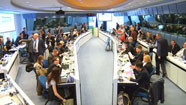On 5 April 2016 the JRC presented the interactive and collaborative online European Energy Efficiency Platform. This beta platform is conceived to fill the gap opened by scattered data and fragmented knowledge resulting from a rapidly growing energy efficiency market. It is expected to be both a one-stop shop for information retrieval and a meeting point for experts to exchange data and reduce redundant activities.
Existing Methodologies and Tools for the Development and Implementation of Sustainable Energy Action Plans (SEAP)
The Joint Research Centre (Institute for Energy and Institute for Environment and Sustainability) is providing technical and scientific support to the Covenant of Mayors project managed by DG TREN. This is a European initiative by which towns and cities voluntarily commit to reduce their CO2 emissions beyond the EU target of 20%, through the implementation of Sustainable Energy Action Plans (SEAPs). The Local Authorities have to submit a Baseline Emissions Inventory (BEI) and a SEAP within one year after the formal adhesion to the Covenant of Mayors. In order to help Local Authorities to fulfil these commitments, a set of technical documents are being prepared. As a first step, a research on existing methodologies and tools for SEAP elaboration and CO2 emissions inventories at local level has been carried out. The present report summarises the results of this research and is divided in two parts: existing methodologies and tools for SEAP elaboration (part I) and CO2 emissions inventories at local level (part II). All these tools and methodologies have been collected from entities/cities with a proven experience in these fields. In addition, in both parts of the document, a signposting table that allows to compare the various existing methodologies and helps the Covenant signatories to choose the methodology most adapted to their requirements has been elaborated. One of this report's most relevant conclusions is the identification of the critical steps that have to be followed in order to secure a successful SEAP elaboration and implementation. These outcomes are the base of the next document, a guidebook called "How to develop a Sustainable Energy Action Plan" that intends to offer practical guidance to local authorities through the entire SEAP process.





To quote this publication use the follonwing format: